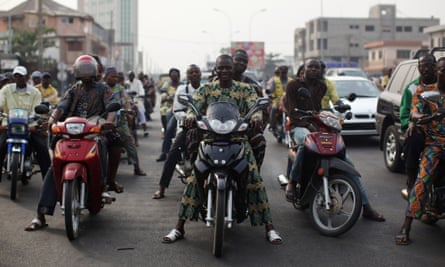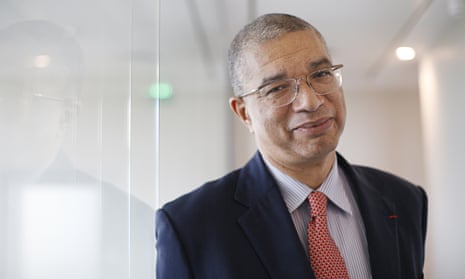With dual French and Beninese nationality, Lionel Zinsou, 60, is an ideal guide for visiting Cotonou, the business capital of Benin. We are riding in a 4x4 but we still feel the countless potholes that scar the streets. “There were 150,000 people living here at independence [in 1960], now they’re 3 million. How many cities in Europe have seen their population multiplied by 20 in half a century?” he asked. This was on 7 June and Zinsou was still a businessman with a largely French focus, not yet an African statesman.
Did the then head of PAI Partners, France’s largest investment fund, know he would become the country’s premier on 18 June? If he did, he certainly didn’t show it. Yet every crossroads, every building draws comments that add up to an action plan. The centrally located airport must be moved, so that its 300-hectare site can be redeveloped. “It’s as if planes landed on the Champs Elysées,” he quips. He also wants to reclaim a 100-hectare plot occupied by a power station with its stock of hazardous chemicals. “Can you imagine a power station on Place de l’Opéra?”
The sky is grey. The broad avenues are wet from yesterday’s rain. The SUV splashes on. Zinsou is talking about how the city is plagued by flooding, because it lies below sea level and is built on a thin layer of sand. He complains about government ministers who allegedly stole €4m ($4.38m) in Dutch funding, earmarked for the water ministry. In May the Netherlands suspended development aid to the country. “It’s criminal to have diverted aid from a country which has mastered the technology of dykes and polders and could prevent our city from being submersed,” he explains. Talk switches to the roads, the tarmac wrecked by overloaded trucks, and the time it takes Chinese contractors to repair them, angering local people. He points to the solar-powered street lights donated by rap-artist Akon and the hordes of motorcycle taxis on the other side of the road. “Cotonou must be one of the few cities in the world with no public transport,” Zinsou says.
The prime minister has an easy command of all these topics, knowing the figures and setting out the solutions. This is the professor of economics speaking, educated at Ecole Normale Supérieure in Paris and subsequently the London School of Economics. But he also reasons as an investor, merchant banker and political adviser, highly respected by the French left, yet also close to former Conservative prime minister Alain Juppé. Only the other day he lunched with former president Nicolas Sarkozy.
The day before we met, Zinsou flew into Cotonou to celebrate the 10th anniversary of the foundation which bears his name and is headed by his daughter Marie-Cécile. Over the years it has staged 22 exhibitions and enabled hundreds of thousands of schoolchildren to discover contemporary African art. Addressing an audience of artists, patrons, policy-makers and diplomats, the “lord of French capitalism” as his friends have dubbed him, quoted André Malraux and Léopold Senghor, citing personal anecdotes and highlighting major challenges for Africa.The next day he was on his way to Ouidah, 40km west of Cotonou, home to his wife’s family and once a centre of the slave trade. With superb examples of Afro-Brazilian architecture, sadly in very poor repair, it will soon be on the Unesco world heritage list. Here too the Zinsou foundation has opened a museum.
As we drive on, the road degenerating into a mere track, everything Zinsou has to say suggests he is itching to get to work. He admits to feeling French and Beninese in equal parts but his destiny seems about to tip firmly on one side. Visiting Paris on 9 June, the president of Benin, Thomas Boni Yayi, had talks with President François Hollande, mentioning his plans to make Zinsou his second-in-command. The next day, interviewed on Radio France Internationale, Yayi confirmed that he would not be seeking re-election, in compliance with the constitution.
Originally elected in 2006, Yayi’s second term has proved increasingly difficult as some of his closest allies deserting him. In May his party lost its majority in parliament. He has failed to deliver on his promise of change and there are only nine months to go before the presidential election in February 2016.
Yayi had to reshuffle the government, several former ministers having won seats in parliament, including those suspected of embezzling Dutch aid. The changes were announced on 18 June. Much to everyone’s surprise, Zinsou was appointed premier. In the meantime he had returned to Paris, but he was on the first flight into Cotonou the next day. The customs officers recognised him but were astonished to see he had no luggage. “I don’t need any, I already live here,” he told them with a smile.
He held his first cabinet meeting on 20 June.

People in Paris were just as surprised. “He’s a deeply committed man, but I never thought he’d go into politics,” says Jean-Michel Severino, formerly head of the French Development Agency and now running an investment fund for small and medium-sized African companies. Franck Riboud, chair of Danone, where Zinsou managed mergers and acquisitions from 1986 to 1997, had noticed his friend’s determination to go back to Benin. “But I never imagined he’d become prime minister!” he says, adding: “He’s very well thought of at Danone.”
Even Laurent Fabius, for whom Zinsou worked as a speechwriter in 1984-86 when the former was prime minister, admits his surprise: “He has always had a sense of the public good, but I thought he’d stay in business.” In Cotonou rumour has it that the French foreign minister helped convince Zinsou to accept the job, but he denies this. “The question of whether I discussed the issue with Lionel Zinsou is a private matter. This appointment was decided by President Boni Yayi. It is a good decision, which we welcome,” Fabius adds.
Hakim El Karoui, a partner at Roland Berger strategy consultants, whom Zinsou took on at Rothschilds, thinks “it was predestined”. “PAI Partners has few interests in Africa, whereas Lionel talked increasingly about Africa. He couldn’t go on leading all these parallel lives,” he says, before acknowledging that the Zinsous have suffered from politics. “Lionel sees politics as being equivalent to violence.” He is referring to Emile Derlin Zinsou, an uncle on the father’s side, who was president of the Republic of Dahomey, a self-governing colony, for 17 months before being ousted by a coup d’état in 1969. Three years later Major Mathieu Kérékou seized power after a military coup. He changed the country’s name to Benin, forcibly established a Marxist-Leninist regime and persecuted his main opponent, uncle Zinsou.
During these hard times, Zinsou, who was born in Paris, continued his studies there. His father was in Dakar as President Léopold Senghor’s doctor. His Franco-Swiss mother worked as a nurse in the French capital. When the young man went to Benin he would stay with his uncle, whom he considers partly responsible for raising him. Zinsou still sees him; now 97, he remains very much on the ball.
For political reasons Zinsou was unable to settle in Benin until 1990, a situation he refers to as being a “virtual Beninese”. Meanwhile his French persona attracted effusive praise. “A man of great rectitude, who thinks clearly and writes well,” says Fabius. “Each time I went on a journey with him I gained in intelligence,” says Riboud. “A true gent,” El Karoui adds. “One of the top people in French business,” Severino concludes.
Even the trade unionists at national daily Libération, where Zinsou was on the board, hailed his sense of dialogue. A number of people at Rothschilds have accused him of being a dilettante. “He has always succeeded in doing several things at a time, which riled bankers hard put to do one thing properly,” El Karoui explains dismissively. The previous management team at PAI Partners, sent packing by Zinsou on his arrival in 2009, still hold a grudge against him. There are also a few members of parliament, led by the Conservative Pierre Lellouche, who have no time for his “Afro-optimism”, firmly convinced that the continent – particularly the French-speaking part – is sinking into poverty and disorder.
In Benin the praise and criticism are loudest. The Communist party and its allies reckon Zinsou “knows nothing about Benin” and that he was appointed “to finish off the sell-out to French imperialism”. Former justice minister Victor Prudent Topanou has forecast his failure and a well known columnist refers to him as the “proconsul”, as if to say he is not Beninese.
Zinsou himself is happy with his dual identity, going so far as to add an Anglo-Saxon dimension.
“Yesterday evening I was walking round Cotonou with my Yoruba hat,” he explains. “There’s no difference between me and a Yoruba in Lagos. I studied in France but also in the UK, and I’ve headed companies in both countries. My son-in-law is British, my grandchildren are Franco-British and Nigerian-Beninese. We should forget about these imaginary divisions.”
The people of Cotonou are convinced he accepted the job of prime minister in order to run for president next year. In an interview with Le Monde Afrique he adroitly dodged this question: “If over the next 10 months we can show that progress is possible on access to electricity, water, healthcare and education ... then people will want the experiment to continue and go further. With me or others. I can think of many good presidential candidates who could carry on this work. I have neither the pride of a candidate, nor the ego of a president.”
On the issue of power, Zinsou suggests that a multinational boss has more clout than an African head of state. But he is fascinated by the challenge.
“No continent, no single country – not even China – has ever found room for a billion city-dwellers in the course of just one generation, as Africa will have to do.
In the rest of the world urban development empties the countryside, whereas in Africa population growth is so buoyant that even in rural areas it is rising.”
Almost all his French acquaintances to whom we spoke wished him the best of luck.
This article appeared in Guardian Weekly, which incorporates material from Le Monde

Comments (…)
Sign in or create your Guardian account to join the discussion